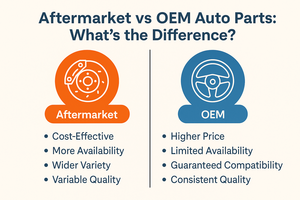Aftermarket vs OEM Auto Parts: What’s the Difference?
Body
When it comes to replacing parts in your vehicle—whether for repair, maintenance, or performance upgrades—you’ll often face a key decision: Should you choose OEM or aftermarket auto parts?
This is a common question among vehicle owners, mechanics, and fleet operators alike. Each option offers distinct advantages and disadvantages depending on your budget, vehicle model, and performance requirements. In this guide, we’ll break down the key differences between OEM and aftermarket parts and help you determine which is right for your automotive needs.
What Are OEM Auto Parts?
OEM stands for Original Equipment Manufacturer. These are parts made by the same manufacturer that built your vehicle or an authorized third-party that builds components to the automaker’s exact specifications.
For example, if you drive a Ford and replace a brake rotor with one made by the same company that supplies Ford's factory, that’s an OEM part.
Pros of OEM Parts:
- Guaranteed Compatibility: Fits your vehicle exactly as the original part did.
- High Quality Assurance: Manufactured to meet strict automaker standards.
- Warranty Coverage: It often comes with a warranty from the automaker or part supplier.
- Dealer Support: Easily available at dealerships and authorized service centers.
Cons of OEM Parts:
- Higher Price Point: Typically more expensive than aftermarket parts.
- Limited Availability: Usually only sold through authorized dealers.
- Less Variety: Limited options in terms of brands and price ranges.
What Are Aftermarket Auto Parts?
Aftermarket parts are manufactured by companies other than the original automaker. These parts are designed to function the same—or in some cases, better—than OEM parts, and are often sold through independent distributors and online retailers.
Like Asquare Parts Inc., they offer a wide selection of aftermarket auto parts, including wholesale trailer supplies, rubber seals, wheel rims, axles, and more for various vehicle models and applications.
Pros of Aftermarket Parts:
- Cost-Effective: Usually cheaper than OEM parts.
- More Availability: Sold by many retailers, both online and in-store.
- Wider Variety: Multiple manufacturers mean you can choose from different levels of quality and pricing.
- Performance Upgrades: Some aftermarket parts are designed for better durability, performance, or aesthetics.
Cons of Aftermarket Parts:
- Variable Quality: Some brands offer excellent quality; others may cut corners.
- Fitment Issues: Not all aftermarket parts fit as precisely as OEM.
- No Standardized Warranty: Warranty terms vary widely between brands.
Key Differences Between OEM and Aftermarket Parts
|
Feature |
OEM Parts |
Aftermarket Parts |
|
Manufacturer |
Original vehicle manufacturer or approved supplier |
Independent manufacturer |
|
Cost |
Higher |
Lower |
|
Quality |
Consistent and certified |
Varies by brand |
|
Availability |
Limited to dealerships |
Widely available online and in-store |
|
Warranty |
Usually included |
Varies or not included |
|
Fit & Compatibility |
Guaranteed |
May require modification or careful selection |
Which One Should You Choose?
The right choice between OEM and aftermarket parts depends on several factors:
1. Your Budget
If you're on a tight budget, aftermarket parts offer better value. Reputable aftermarket brands can provide high-quality alternatives at a fraction of the OEM price.
2. Your Vehicle's Age
For older vehicles, investing in OEM parts might not be cost-effective. In such cases, aftermarket parts extend the life of your car or trailer without breaking the bank.
3. Type of Repair
- Critical parts (like brakes, engine components, or suspension systems) may be safer with OEM.
- Non-critical parts (like mirrors, trim, or filters) can be confidently replaced with aftermarket alternatives.
4. Resale Value
If maintaining resale value is important, especially for newer or leased vehicles, OEM parts may be preferable, as they keep the vehicle in factory condition.
5. Fleet or Bulk Use
Businesses that operate fleets, trailers, or commercial vehicles often choose aftermarket parts in bulk to minimize operational costs. Asquare Parts Inc. provides wholesale trailer supplies tailored to these needs.
How to Spot a High-Quality Aftermarket Part
Not all aftermarket parts are created equal. Here’s what to look for to ensure quality:
- Brand Reputation: Choose trusted manufacturers with positive reviews and industry recognition.
- Certifications: Look for ISO, SAE, or OEM-equivalent certifications.
- Warranty Coverage: A reliable warranty often indicates a trustworthy product.
- Material & Finish: Inspect the material for durability and design integrity.
At Asquare Parts, we source aftermarket parts only from vetted suppliers to ensure long-term performance and customer satisfaction.
Why Asquare Parts Inc. Is Your Trusted Source
Whether you’re buying OEM-grade or premium aftermarket parts, Asquare Parts Inc. provides reliable solutions for individuals, repair shops, and fleet managers.
We specialize in:
- Wholesale trailer supplies
- Automotive rubber seals
- Custom wheel rims
- Injection-molded parts for vehicles and trailers
- Axle components and suspension systems
With bulk pricing, fast U.S. shipping, and dedicated customer support, we help you make the right choice—OEM or aftermarket—based on your unique needs.
Final Thoughts
Choosing between OEM and aftermarket auto parts isn’t always black and white. OEM parts ensure a perfect fit and peace of mind, while aftermarket parts offer cost savings and flexibility. For many customers, especially those sourcing parts in bulk or managing fleets, high-quality aftermarket parts strike the right balance between price and performance.
Before making a decision, consider your budget, the part's role, and the reputation of the supplier. At Asquare Parts Inc., we’re here to help you make that decision confidently—every time.







Comments